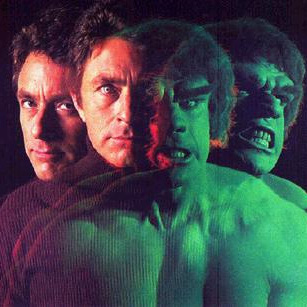Johnson had previously done television sci-fi, working on The Six Million Dollar Man and introducing the character of Jamie Sommers before spinning her off into her own series, The Bionic Woman. After crafting the Hulk, he was then responsible for creating the original V mini-series as well as producing Alien Nation. He also wrote some and directed all of the Alien Nation TV movies that aired throughout the Nineties.
My point being that with The Incredible Hulk, the producers went after and got someone who was experienced in the genre, gave him both writing and directing responsibilities, and were rewarded with the most mature and creatively satisfying Marvel live-action production we'd get for well over a decade.
And casting Bill Bixby as David Banner (legend has it 'Bruce' was deemed too gay a name for the character, although Johnson claims it was to honor his late son) was the masterstroke. Television success is all about befriending the audience. If the viewers feel comfortable with an actor, they will put up with most anything when it comes to story. And Bill Bixby had built up a lot of audience goodwill over the years, mainly due to sixties classics, My Favorite Martian and The Courtship of Eddie's Father.
Although out of the public eye for half a decade, Bixby had just struck paydirt with a role in the 1976 miniseries Rich Man, Poor Man and was intrigued with the approach Johnson took with The Hulk.
You see, unlike The Amazing Spider-Man, where the origin was slipped in almost by accident to a pedestrian, sci-fi tinged crime plot, The Incredible Hulk spent the first chunk of its ninety minute runtime dealing with Banner as a character, establishing his obsessions and building up the tragedy of his dead wife-- not to mention, the guilt he felt about not being able to save her-- before introducing the origin and the monster. The results and repercussions of his transformation are the focus of the rest of the film with no distractions.
Two weeks later, another pilot aired, The Incredible Hulk: A Death in the Family, and it was this adventure that would establish the narrative format for the ongoing series. After the set-up the character was given in the first pilot, "Death in the Family" gets right to telling its story without side-tracking itself with unnecessary exposition.
This time out, Johnson wrote the script, but Alan J. Levi directed. The two men had worked together on The Bionic Woman, and Levi would go on to direct episodes of the original Battlestar Galactica, Airwolf, Quantum Leap, Lois & Clark, and eventually, one episode of Buffy the Vampire Slayer. In short, not only was he a solid working director who shared a history with the main creative mind behind the show, he would go on to work in the sci-fi/action genre well into 2004.
So it should come as no surprise that "A Death in the Family" works very well as a launching point for a series that would last five full seasons under Johnson's hand. The majority of episodes stuck to a formula-- Banner shows up under an assumed name (he faked his death and had been on the run since the end of the pilot), meets someone in trouble, Hulks out a couple times while helping them get out of trouble, then moves on-- that was basically The Fugitive with green body paint and a Beatles wig.
And while the story of "A Death in the Family" is fairly one-note, we do get to see the Hulk fight a grizzly bear. In a river. While an old drunk guy watches. And we only barely care that thrashing about in the water is washing the green off of body-builder Lou Ferrigno.
The Incredible Hulk shared the CBS airwaves with DC's Wonder Woman, which had launched the year before, and then, based on the success of the television movie, The Amazing Spider-Man, which started its run as a weekly show on April 5, 1978. Although calling it a full-fledged series is a bit of a stretch as only five episodes would air that first season.
Paul Brian McCoy's series will continue next week with a look at the 1970's versions of Doctor Strange and Captain America.


